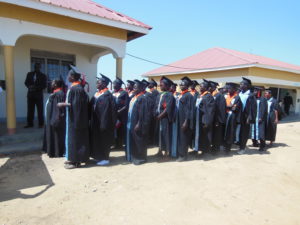What comes to your mind when you hear the word “youth”-especially in Africa, and more so in the chronically deprived and historically insecure pastoral areas of Karamoja in Northern Uganda? The Youth have been variously labelled as warriors, cattle rustlers and perpetrators of crime and violence. Simple as it may sound, it is a moral disgrace that many youth remain trapped in a poverty cycle manifested by multiple and intersecting forms of long-standing development barriers including access to: education, employment, good health, decision making, and emotional and social wellbeing. The worst hit are the young women who are left at the mercy of Sexual and Gender Based Violence (GBV).
The question then is: Do we really want the youth to continue jeopardizing their future? Of course not! In fact, the good news is that, this will no longer be the case, thanks to the just concluded together program. Building on our rich legacy of community mobilization, CWS—in partnership with the MAP International (MAP), ECHO, Inc. (ECHO) and St. Mary’s United Methodist Church Foundation, Inc. (SMUMCF) —initiated the together alliance, a 5-year multifaceted program with the aim of “building and catalyzing community resilience” in Kacheri sub-County in Kotido district, Karamoja region of Uganda. Among the project’s successes is the construction of a Youth Vocational Skills Training Center. The youth centre explicitly seeks to address the ingrained barriers to youth empowerment by equipping young people, especially those from disadvantaged backgrounds, with vital skills they need for navigating the complex dynamics of the radically changing world.
The central elements of the vocational courses are Brick laying and Concrete Practice (BCP), Tailoring and Garment Cutting (TGC), and Reusable Sanitary Wear Techniques (RSW). Beyond the technical skills, there is also the “soft skills” training in theology, communication, problem solving, entrepreneurship, and business management.
From the pioneer group that enrolled at the Centre, 9 youth in BCP and 19 youth in TGC successfully managed to complete the 9-month courses and obtained a certificate at a recent graduation and handing over to the Kotido district local government under the department of education. The event was presided over by the local district commissioner and attended by other key government representatives, including from the education and security departments.
In this connection and speaking on behalf of the other students Hellen Ngorok, the group student leader expressed gratitude to the together program for not only constructing the youth centre but also building their capacity for self-sustenance.
Addressing the congregants at the ceremony, Mary Obiero—the CWS Africa senior Program Coordinator—said: “as I look at these new graduates, I not only see people with skills in tailoring or BCP, but also emerging leaders.” She further added that CWS strongly believes in finding lasting, sustainable solutions to fighting extreme poverty and hunger and that so far, engaging youths has proven to be a powerful force for introducing and scaling up innovations in this endeavor.
That said and given the sheer scale of the youth challenges in Karamoja, it’s not a hyperbole to suggest that the youth centre will serve as a master seed and transform youths as agents of political, social, cultural and economic transformation in the community. As such, youth empowerment, especially through vocational skill training, should be a constant aspiration and ultimate goal for all community stakeholders concerned with the wellbeing of the Karamoja community—and beyond. In doing so, they will be putting an end to the systemic poverty and marginalization that has plagued the area for far too long.
Prepared by: Caleb Wafula, Program Assistant, CWS Africa- RDP

